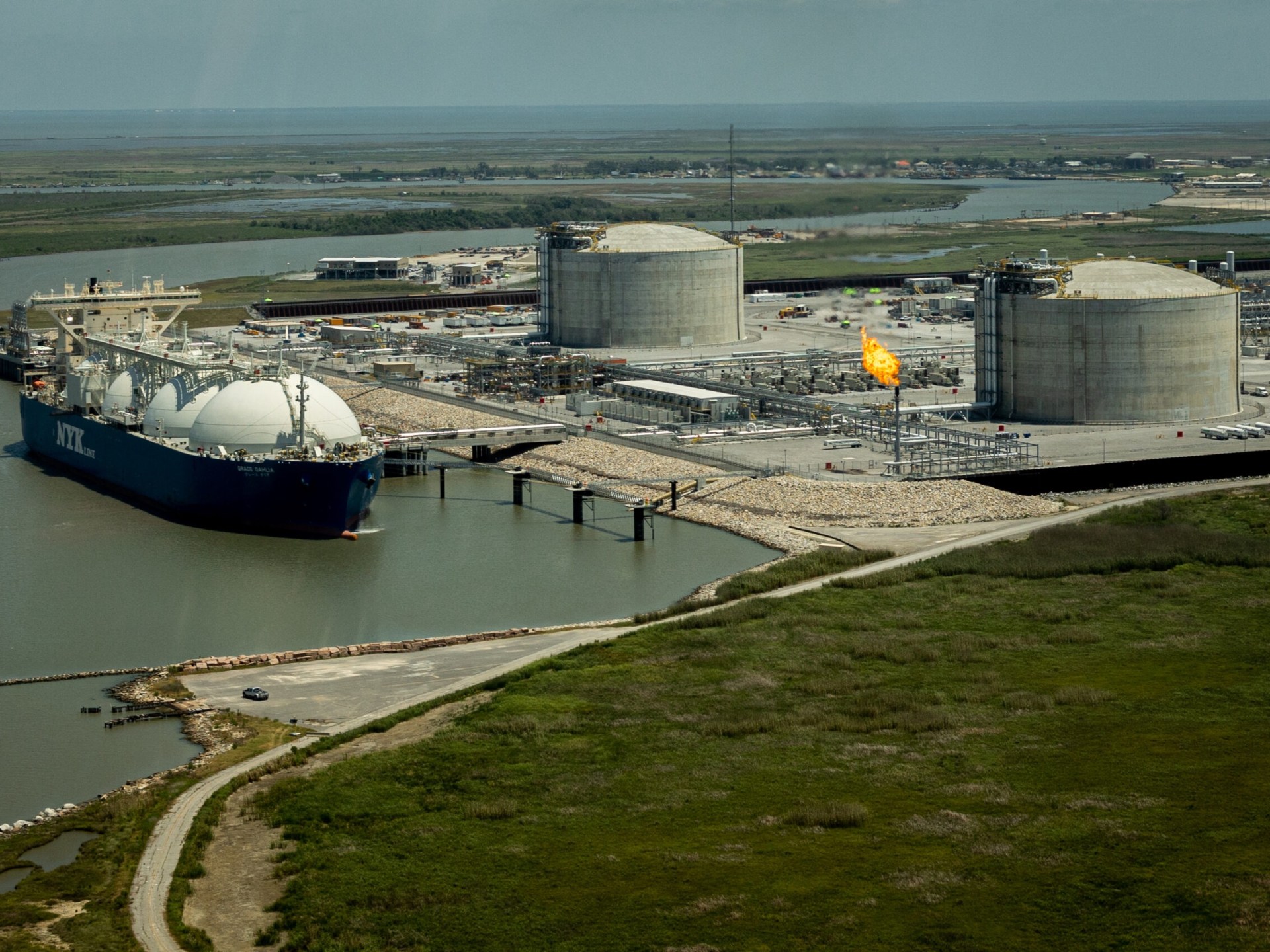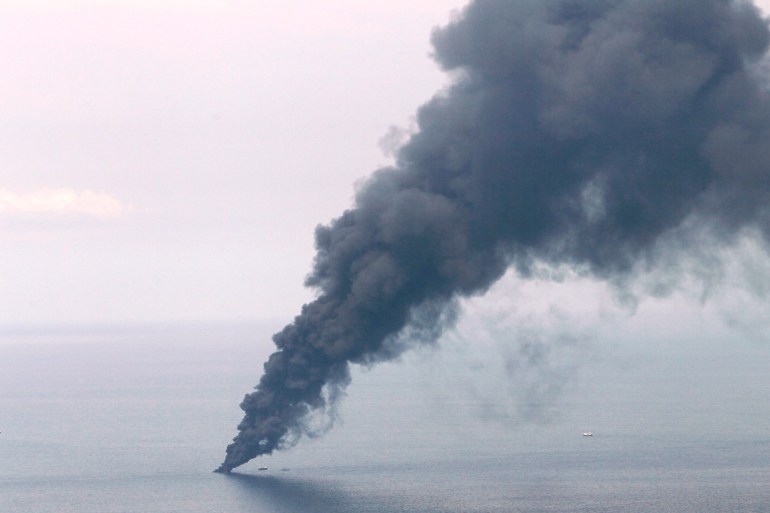
Travis Dardar, a fisherman and member of the Isle de Jean Charles tribal community off the coast of Louisiana, was displaced twice by fossil fuels.
Rising sea levels forced him and his tribe in 2016 to leave the island where they settled in the 1830s to escape the Trail of Tears, the U.S. government’s forced removal of indigenous tribes. “If anyone has seen climate change, that guy is me. I saw this place disappear right before my eyes,” he told Al Jazeera.
He settled in Cameron Parish, a coastal community in Louisiana, where he was able to make a living working in one of America’s largest fishing industries. However, in August he was displaced again by Venture Global’s construction of Calcasieu Pass 2, a liquefied natural gas (LNG) terminal being built to transport fossil fuels abroad. He took over in August, moved off-site and now commutes two hours to Cameron for oyster season.
He said LNG terminals threaten his livelihood in the fishing industry.
After a decades-long fracking boom, the United States has become the world’s largest LNG exporter. The Gulf of Mexico is at the forefront of America’s LNG export boom, with huge terminals growing along the coasts of Texas and Louisiana. Dubbed “clean energy” by the fossil fuel industry, LNG is actually mostly composed of methane, one of the most powerful greenhouse gases.
President Joe Biden’s administration now faces a key climate decision: whether to approve Venture Global’s Calcasieu Pass 2 (CP2), one of more than 20 planned LNG export terminals. CP2 cannot export to certain countries unless the Department of Energy decides it is in the public interest. The LNG would largely be exported to Europe, which is turning away from Russian gas because of the war in Ukraine.
The Federal Energy Regulatory Commission (FERC) will make a decision on CP2 later this month. Following FERC’s decision, the Department of Energy will decide whether an export license for CP2 is in the public interest.
Venture Global did not respond to a request for comment. In the past, the company had argued that the project would create more than 1,000 permanent jobs in Cameron Parish and that LNG could replace coal in some countries to reduce emissions.
However, new work by a leading methane scientist found that the overall life cycle of exported LNG can be 24 percent worse than the life cycle of coal.
“A Shrimp Pocalypse”
In November, Dardar, along with other Louisiana activists, traveled to Washington, D.C. to protest against CP2 in front of the Department of Energy and Venture Global buildings. He helped deliver a petition against the project to the department with 200,000 signatures.
Louisiana is that largest seafood producer in the lower 48 US states. The industry has total retail, import and export sales of more than $2 billion and employs more than 26,000 people in the state.
But Dardar said LNG companies had bought up and demolished the fishing docks, and the Coast Guard urged fishermen to stay out of the way of the LNG tankers or they would be arrested. He said last year a huge wave from a tanker ripped parts off his boat.
Oyster, shrimp and fish stocks are at risk Climate change and oil spills. Oil spills are common in the region, including BP disaster on the Deepwater Horizon oil rig In 2010, 200 million gallons (760 million liters) of oil spilled into the Gulf of Mexico and took four years to clean up. Most recently, 1 million gallons (3.8 million liters) of oil spilled off the coast of Louisiana in November.
If LNG construction continues, Dardar fears a collapse of the fishing industry. “They’re talking about a shrimppocalypse,” he said.
The United States, the world’s largest historical emitter of greenhouse gases, is on track to set a record in fossil fuel extraction. This also includes breaking gas production records. It’s not just the USA not on the right track To achieve its emissions reduction targets, emissions from exported LNG are not included in domestic calculations remain uncounted.
Environmental groups, members of Congress and Louisiana residents are calling on the Biden administration to deny the CP2 permit.
A group of lawmakers sent a letter in November urging Energy Secretary Jennifer Granholm to reject the project, saying the lifecycle emissions of all existing planned LNG terminals would be equivalent to those of 681 coal-fired power plants. CP2 alone would account for 20 times the emissions of the Willow Project, a controversial oil drilling project in Alaska that the Biden administration approved in March.
Senator Jeff Merkley, one of the signatories of the letter, told Al Jazeera: “The United States has spread a massive myth that fossil gas is better for the climate than coal. This is a huge disservice to the world because it is scientifically incorrect and also undermines our legitimacy in the climate discussion. This is practical because we are closing coal mines and expanding fracking and gas instead.”
“We’ve built seven export facilities, and the next one, CP2, is becoming a point where we can focus our attention on that – which is essentially a big myth or a big lie from the US government that is affecting our efforts to achieve this , undermines.” “Humanity must address this key problem,” Merkley said.
He said if the U.S. doesn’t do its part on the climate, it will allow other countries to continue extracting fossil fuels as well. “Because if America doesn’t change its ways despite being the largest historical producer of carbon dioxide, [others can say] Why should we change ours?”
Health effects

The fishing industry is not the only community affected by the LNG boom. Residents living near the LNG plants suffer not only from climate change but also from health effects.
Roishetta Ozane, founder and director of the Vessel Project of Louisiana and mother of six, was one of the activists who delivered the petition to the Department of Energy in Washington.
She said the LNG terminals are polluting the air and sea level rise from climate change is causing wetlands to flood and groundwater to be replaced by salt water.
“There is nothing safe about LNG – it is greenwashed and should be called LMG [liquefied methane gas] because of the methane pollution it emits,” she wrote in a text to Al Jazeera. “There is only one person who can end this injustice: President Biden.”
Cameron resident John Allaire, who worked in the oil and gas industry for decades before retiring, stood on his porch and looked down the coast, where he saw a huge beacon from Calcasieu Pass just a mile (1.6 km) away Venture Global can see an existing LNG plant. The company’s planned CP2 terminal would be built nearby. A horn sounded as a tanker alongside the facility prepared to leave the dock.
When Allaire first moved to his property in the 1990s, there was no industrial pollution and he could see the stars at night. Now the torches light up the sky “like in Las Vegas.” He and his wife often smell the plant’s fumes. “When the wind comes from this direction, it literally becomes hard to breathe out here,” he said.
He has experienced strong hurricanes, including one in 2005 with a storm surge so high that it swept his house into the sea. Hurricanes leave behind debris that dries out and becomes fuel for wildfires. That year, Louisiana experienced an extreme drought and a wildfire threatened Allaire’s home before it could be extinguished.
“It’s silly what we’re doing – this huge experiment to see how much carbon we can put into the atmosphere,” he said.
He described a rush to get oil and gas out of the ground and sell it as quickly as possible. “This is capitalism at its best – just monetize it as quickly as possible and face the consequences.”
Back on his boat, Dardar said he hoped the Energy Department would reject approval for CP2.
“Nobody comes to Louisiana to look at LNG facilities. They come for the seafood. They come for the Cajun music. They come for the gumbo,” he said.
“If they give them permission, we will definitely continue fighting. I will fight until they put me in the ground if necessary.”






Recent Comments